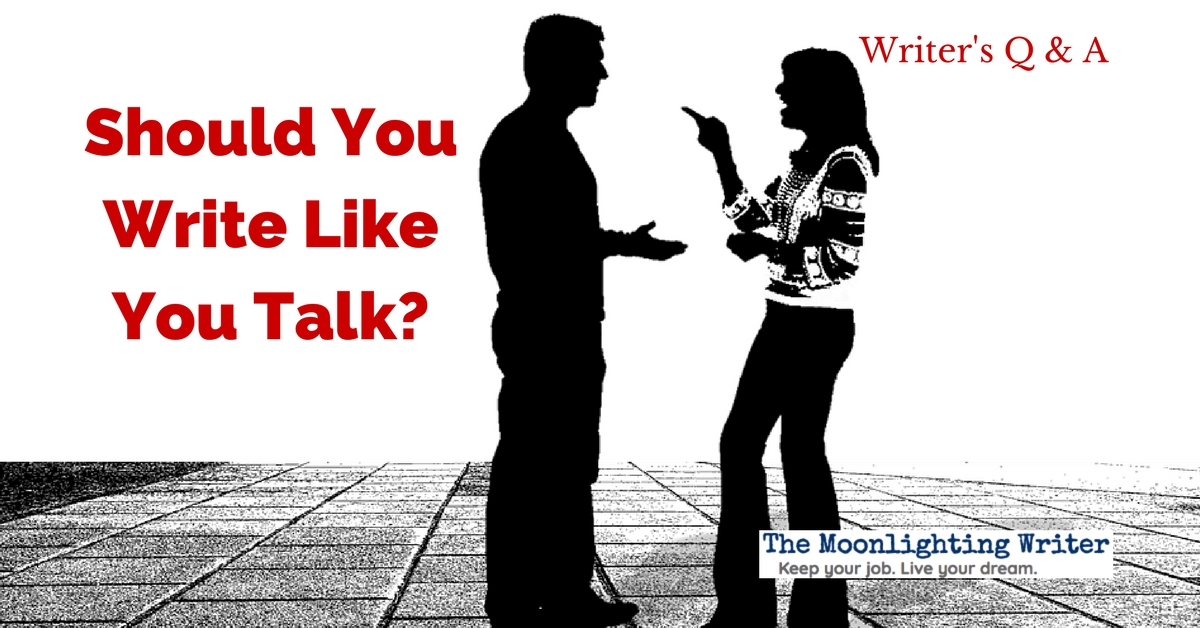One issue that divides writing experts is whether authors should strive to “write like you talk” or adopt a more formal and rigid approach to our prose.
Strong arguments can be — and are — made on both sides of the line, but what’s best for you?
The answer will depend on your genre and target audience to a large degree, but most authors would do well to strive for a conversational tone while also cleaning up many of the grammatical atrocities that seep into everyday speech patterns.
Achieving this balance can be tricky, but it all starts with some basic understanding of the two types of verbal communication.
Differences Between Speaking and Writing
No matter how you structure either, there are inherent differences (Blogmutt link) between speaking and writing — and audiences of both forms of communication come to rely on those differences.
Speech tends to be spontaneous, while writing is almost always planned out to some degree. This premeditation leads to more careful consideration of grammar and word constructs when we’re writing than when we’re speaking.
We’re also more vigilant for redundant phrases, stammering dialogue, and overuse of idioms when we’re writing simply because we’re moving more slowly and all of the words are there in plain sight.
While listeners are more apt to gloss over imperfections in presentation due to the speed of conversation and ears trained to interpret inflection and intent, readers rely on clear and accurate prose to get your point.
Write Like You Wish You Talked
Given these differences, you have to formalize your writing to some extent when compared to your speech or you risk losing readers to poor grammar and punctuation.
On the other hand, striving for perfection in your writing can lead to either flowery, unrealistic prose or stilted language that is boring and robotic. Think about the books you enjoy the most … is the writing stuffy and formal or more conversational?
So, what’s the solution?
As Taylor Lindstrom writes for men with pens, maybe we should strive for something in the middle.
Write the way you talk – if you can speak persuasively, eloquently, and clearly.
To paraphrase this paraphrasing of the age-old advice, perhaps the best approach in most cases is to write like you wish you talked.
Sounds reasonable, but how do you go about that?
With some careful attention to your tone and mechanics, you can learn …
How to Write Like You Talk … But Better
Here are some tips to help you find that happy medium between a conversational tone and perfection in your writing.
1. Write your first draft like you talk.
In most cases, your first attempt at a story, chapter, or blog post should be written in your natural “voice.” This will give you the best possible chance of presenting a final product that resonates with your reader, and it also helps you fill the page much more quickly than searching for perfect word choices in every sentence.
2. Keep your vernacular.
As Marus Sheridan at The Sales Lion points out, every setting and type of writing have a certain vocabulary and diction that’s accepted and expected by readers. Stick to the basic framework of those constructs and you’ll go a long way toward connecting with your audience.
3. Don’t be afraid of idioms and clichés.
Related to vernacular is the issue of idioms and clichés. While standard writing advice is to avoid hackneyed terms like the plague, they are powerful in imparting connotation to your reader. They’re also economical in terms of word count, which is important when you’re constrained — as in short blog posts or flash fiction.
4. Stay in storytelling mode.
Storytelling is a tradition as old as mankind itself. We’re hardwired to tell and listen to tales that evoke powerful mental images and draw analogies to well-understood concepts. No matter what you’re writing, try to imagine yourself in front of a campfire with your audience gathered around you. What kind of language would you use in that situation to tell your story? Use the same language when you write your story.
5. Edit ruthlessly.
As much as we respond to storytelling and conversational prose, we bristle just as much (or more) at poorly constructed or repetitive writing. The price you must pay for writing like you wish you spoke is that you must edit your work with a heavy and merciless red pen.
Slash through sentence fragments.
Kill redundant thoughts.
Improve clarity at every opportunity.
Make your imperfect text as perfect as it can be while still sounding like you.
6. Develop your writer’s voice.
Over time, strive to become more consistent with the way you tell your stories through writing. Hone in on the tone, style, word choice, and other literary elements that define you as an author and best connect you with your audiences.
In other words, develop your author’s voice.
—
Do you write like you speak, or is your prose more formal? Let me know in the comments below.
